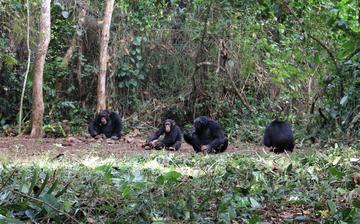Past their prime? Tool use declines with age in wild chimpanzees
New research by a team from the University of Oxford including Dr Katarina Almeida-Warren, postdoctoral researcher at the School of Anthropology and Museum Ethnography, has found that old age likely impacts the habitual tool-use behaviours of some wild chimpanzees – although the extent to which different individuals are affected appears to be highly variable. The findings have been published in the journal eLife.

Several chimpanzees cracking nuts using stones at the outdoor laboratory Credit: Katarina Almeida-Warren
Wild chimpanzees show reduced participation and performance in their tool-use behaviours as they grow older, according to the long-term video observations used in the new study. This provides solid evidence that old age leads to gradual withdrawal from tool use and is a contributing factor to lower efficiency in chimps' stone tool selection and use.
The findings also indicate that chimpanzees mirror human beings in how the aging process affects their ability to carry out dextrous and cognitively-challenging daily tasks. Similar to humans, the effects of old-age varied considerably between individuals, with some chimpanzees struggling to use tools, whilst others maintained excellent performance into later life.
Wild chimpanzees use tools during some of the most cognitively and physically demanding foraging behaviours observed in non-human animals. While the behavioural changes that occur with aging have been widely studied in humans and some captive primates, exceptionally little is known about how growing older affects the lives of elderly wild apes. This includes how the capacity to address technical, real-world tasks changes as chimpanzees become progressively older.
To address this gap, the researchers used long-term data collected from almost two decades of study of chimpanzees in the Bossou forest, Guinea. Wild chimpanzees at the site are known for using stones as hammers and anvils to crack open oil palm nuts – a population tradition that requires selecting appropriate tools and executing a coordinated strike. The chimpanzees were systematically studied using an ‘outdoor laboratory’ in a clearing in the forest, where nuts and stone tools were made available for use by wild chimpanzees over many decades. The researchers monitored the behaviour of five chimpanzees, four female and one male who, across a 17-year period, were estimated to age from between from approximately 39-44 years old, to 56-61 years of age.
Elderly chimpanzees showed a significant decline in their attendance at the outdoor laboratory over successive field seasons, unlike younger adults, suggesting that elderly chimpanzees began to gradually withdraw from nut cracking behaviours. For some elderly individuals, this decline in attendance was accompanied by a marked reduction in time spent interacting with nuts and stone tools when at the outdoor laboratory, further suggesting a broader pattern of age-related resignation from nut-cracking activity.
Researcher Dr Katarina Almeida-Warren said:
"Just as with human technical skills, chimpanzee tool use is culturally learned through social learning and individual practice and forms an important part development; but less is known about the impacts of senescence on such skills. I was one of the last researchers to observe Yo (an elderly chimpanzee that is estimated to have lived until 60) close to the end of her life. Once a highly efficient tool user, it was clear that her motor skills had declined considerably. Thanks to the Bossou video archive, we have been able to study Yo and other chimpanzee elders over nearly two decades and learn how extreme ageing affects behaviour and cultural skills in chimpanzees."
Elderly chimpanzees also showed changes in their efficiency when selecting tools (with some taking noticeably longer in later years), and when using tools to crack open nuts. Nut-cracking efficiency declined across several metrics, including increases in the time taken and the number of actions required to process each nut.
https://www.youtube.com/embed/g8u4BS404IE?si=CgQypaplDiETv_u_Interestingly, the authors noted stark differences in the magnitude of changes across individuals, with some chimpanzees showing pronounced reductions in efficiency, and others remaining relatively stable throughout old age. These results point towards significant individual differences in how old age influences wild chimpanzee behaviours, similarly to the variable patterns of behavioural and cognitive aging observed in human populations.
Elsewhere, Dr Almeida‑Warren was also featured in the “Dare to Explore” segment of the National Geographic Kids June/July 2025 edition, where she shared insights on tracking chimpanzee in Guinea to study their behaviour – inspiring future generations of researchers around the world.


